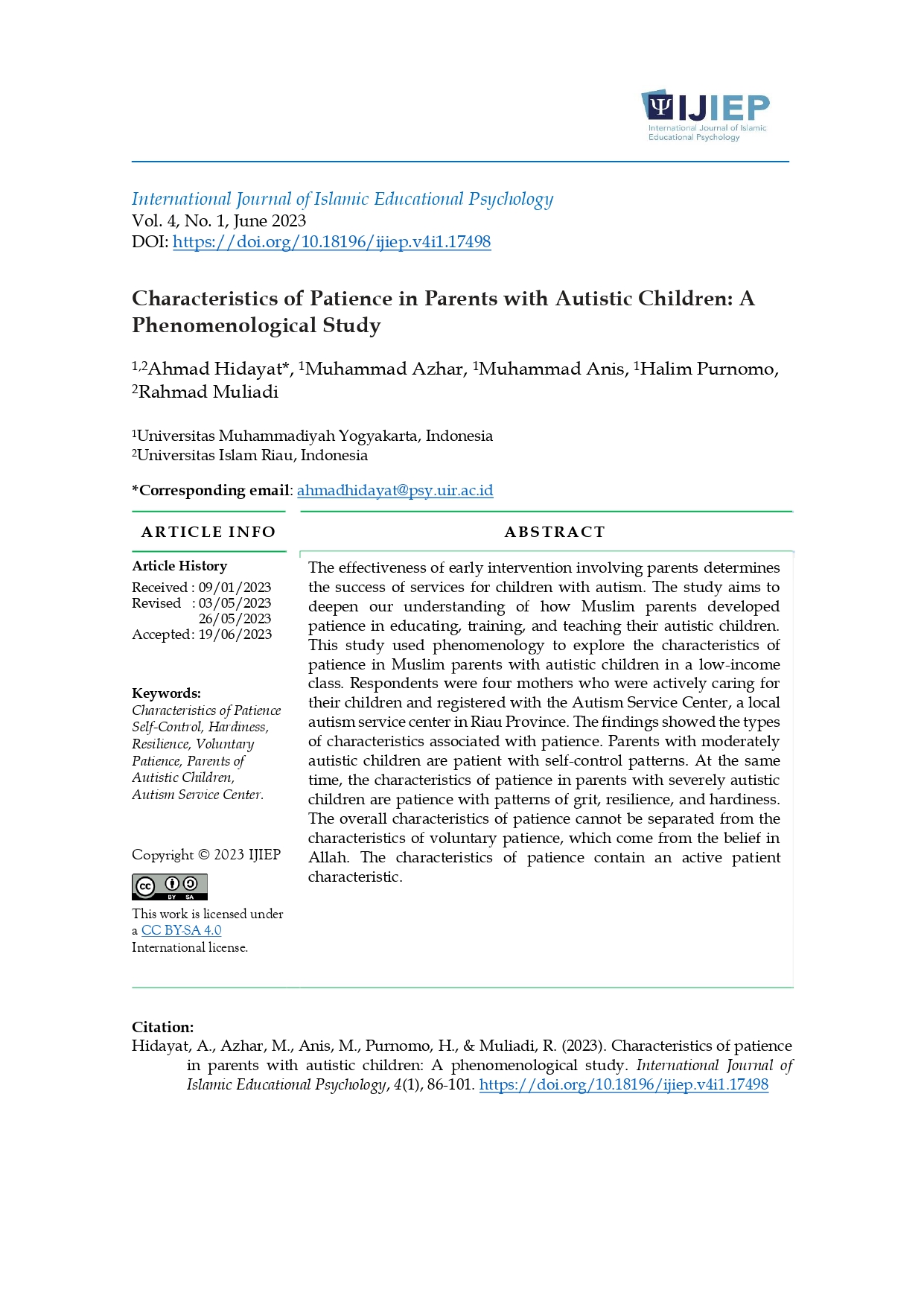Characteristics of Patience in Parents with Autistic Children: A Phenomenological Study
DOI:
https://doi.org/10.18196/ijiep.v4i1.17498Keywords:
Characteristics of Patience Self-Control, Hardiness, Resilience, Voluntary Patience, Parents of Autistic Children, Autism Service Center.Abstract
The effectiveness of early intervention involving parents determines the success of services for children with autism. The study aims to deepen our understanding of how Muslim parents developed patience in educating, training, and teaching their autistic children. This study used phenomenology to explore the characteristics of patience in Muslim parents with autistic children in a low-income class. Respondents were four mothers who were actively caring for their children and registered with the Autism Service Center, a local autism service center in Riau Province. The findings showed the types of characteristics associated with patience. Parents with moderately autistic children are patient with self-control patterns. At the same time, the characteristics of patience in parents with severely autistic children are patience with patterns of grit, resilience, and hardiness. The overall characteristics of patience cannot be separated from the characteristics of voluntary patience, which come from the belief in Allah. The characteristics of patience contain an active patient characteristic.References
Abdollahi, A., Abu Talib, M., Carlbring, P., Harvey, R., Yaacob, S. N., & Ismail, Z. (2018). Problem-solving skills and perceived stress among undergraduate students: The moderating role of hardiness. Journal of Health Psychology, 23(10), 1321–1331. https://doi.org/10.1177/1359105316653265
Al Jawziyah, I. Q. (2019). Mukhtasar Uddah ash-Shabirin Wa Dzakhirah asy-Syakirin (Izzudin Karimi, Penerjemah). Jakarta : Darul Haq.
Bayat, M. (2007). Evidence of resilience in families of children with autism. Journal of Intellectual Disability Research, 51(9), 702–714. https://doi.org/10.1111/j.1365-2788.2007.00960.x
Dewi, C. P. D. C., & Widiasavitri, P. N. (2019). Resiliensi ibu dengan anak autisme. Jurnal Psikologi Udayana, 6(01), 193–206. https://doi.org/https://doi.org/10.24843/JPU.2019.v06.i01.p19
Dudley, K. C. (2003). Empirical development of a scale of patience. West Virginia University.
Fadilah, R., & Madjid, A. (2020). Patience therapy to reduce adolescents' anxiety assessed from personality and parenting. International Journal of Islamic Educational Psychology, 1(1), 1-11. https://doi.org/10.18196/ijiep.1101
Hagger, M. S., Zhang, C. Q., Kangro, E. M., Ries, F., Wang, J. C., Heritage, B., & Chan, D. K. (2021). Trait self-control and self-discipline: Structure, validity, and invariance across national groups. Current Psychology, 40(3), 1015–1030. https://doi.org/10.1007/s12144-018-0021-6
Hänsch, V. (2020). On patience: perseverance and imposed waiting during dam-induced displacement in Northern Sudan. Critical African Studies, 12(1), 79–92. https://doi.org/10.1080/21681392.2019.1697317
Hanurawan, F. (2016). Metode penelitian kualitatif untuk ilmu psikologi. Jakarta: PT. Raja Grafindo Persada.
Hasdiansah, H. (2013). Autis pada anak, pencegahan, perawatan, dan pengobatan. Yogyakarta: Nuha Medika.
Herdiansyah, H. (2010). Metodologi penelitian kualitatif untuk ilmu-ilmu sosial. Jakarta: Salemba Humanika.
Hizbullah, K. & Mulyati, R. (2022). The role of gratitude and family support on psychological well-being of mothers with autistic children. International Journal of Islamic Educational Psychology, 3(1), 2-18. http://dx.doi.org/10.18196/ijiep.v3i1.13190
Kashim, M. I. A. M., Long, S., Hasan, Z., & Ridzuan, R. (2020). Resilience and patience (sabr) in Islamic view when observing the movement control (order MCO) during the covid 19 pandemic. International Journal of Psychosocial Rehabilitation, 24(01), 5485–5497. Retrieved from https://www.academia.edu/download/67681284/ERA_Journal_Paper_21_2020.pdf
Kemenkes RI, A. (2022, April 7). Autisme A-Z Webinar Peringatan Hari Peduli Autisme Sedunia 2022. Kementrian Kesehatan RI Direktorat Jendral Kesehatan Masyarakat. Retrieved from https://kesmas.kemkes.go.id/konten/133/0/autisme-a-z-webinar-peringatan-hari-peduli-autisme-sedunia-2022
Kementerian Pendidikan Kebudayaan Riset dan Teknologi. (2022). Data Peserta Didik Kota Pekanbaru - Dapodikdasmen. Retrieved from https://dapo.kemdikbud.go.id/pd/2/096000
Kuhl, J. (1984). Volitional aspects of achievement motivation and learned helplessness: Toward a comprehensive theory of action control. Progress in Experimental Personality Research, 13, 99–171. https://doi.org/10.1016/B978-0-12-541413-5.50007-3
Lincoln, Y. S., & Guba, E. (1985). Naturalistic Inquiry. California: Sage Publications.
Manyena, S. B. (2006). The concept of resilience revisited. Disasters, 30(4), 434–450. https://doi.org/https://doi.org/10.1111/j.0361-3666.2006.00331.x
Maria, D., & Ediati, A. (2018). Hubungan antara ketabahan dengan kesejahteraan psikologis pada wanita penyandang lupus eritematosus sistemik. Jurnal EMPATI, 7(2), 536–552. https://doi.org/10.14710/empati.2018.21674
Martinez, D. (2022). Patience, its role in our life – A definition academic article. Asia Pacific Journal of Religions and Cultures, 6(1), 17–35. https://so06.tci-thaijo.org/index.php/ajrc/article/view/256230
Maxwell, N. A. (1979). Patience. Speeches – Brigham Young University.
Mudjito, Hariza, & Supena, A. (2014). Layanan pendidikan transisi anak autis. Direktorat Pembinaan Pendidikan Khusus dan Layanan Khusus Direktorat Jendral Pendidikan Dasar.
Qodariah, S., & Puspitasari, N. R. (2016). Correlation between patience and coping strategy of mothers with autistic children. International Journal of Social Science and Humanity, 6(12), 919. Retrieved from http://www.ijssh.net/vol6/773-HS0027.pdf
Rahmanawati, F. Y., Subandi, M. A., & Khilmiyah, A. (2022). Exploration of inner resources in religious experience of muslim family caregivers for autistic children in Indonesia. The international journal of religion and spirituality in society, 13(1), 1-15. https://doi.org/10.18848/2154-8633/CGP/v13i01/1-15
Sabandar. (2019). Pakar Pendidikan Autisme Internasional Berbagi Cerita di UGM - Health Liputan6.com. Retrieved from https://www.liputan6.com/health/read/4033051/pakar-pendidikan-autisme-internasional-berbagi-cerita-di-ugm
Silverman, C., & Brosco, J. P. (2007). Understanding autism: Parents and pediatricians in historical perspective. Archives of Pediatrics & Adolescent Medicine, 161(4), 392–398. https://doi.org/10.1001/archpedi.161.4.392
Subandi, P. (2011). Sabar: Sebuah konsep psikologi. Jurnal Psikologi UGM, 38(2), 130454. https://doi.org/10.22146/jpsi.7654
Tajab, M., Madjid, A., & Hidayati, M. (2019). Psychology of patience in al-Misbah exegesis. Humanities and Social Sciences Reviews, 7(5), 1221–1230. https://doi.org/10.18510/hssr.2019.75161
Zainal, K., Zakaria, S. M., & Aun, N. S. M. (2021). The domain of challenges and coping mechanisms amongst caregivers of autistic children. International Journal Of Academic Research In Business And Social Sciences, 11(6), 946. http://dx.doi.org/10.6007/IJARBSS/v11-i6/10225

Downloads
Published
How to Cite
Issue
Section
License

- Share — copy and redistribute the material in any medium or format
- Adapt—remix, transform, and build upon the material for any purpose, even commercially.
The licensor cannot revoke these freedoms as long as you follow the license terms. Under the following terms:
- Attribution: You must give appropriate credit, provide a link to the license, and indicate if changes were made. You may do so in any reasonable manner, but not in any way that suggests the licensor endorses you or your use.
- ShareAlike: If you remix, transform, or build upon the material, you must distribute your contributions under the same license as the original.
- No additional restrictions — You may not apply legal terms or technological measures that legally restrict others from doing anything the license permits.






